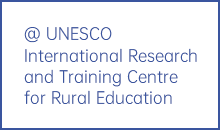Background
1. The New National Curriculum
With the passage of decades, China has made rapid development on education infrastructure and schooling access, which is no longer a tough challenge even in remote rural areas, especially with the support of National Scheme on Compulsory Education for Poor Areas 2. In 2006, the net enrolment rate for primary education was 99.27% (MoE, 2007). Though rural areas fell behind in enrolment, the gap is not that big; therefore, education quality has become a top concern for government on different levels and relevant stakeholders.
When entering the new millennium, the Ministry of Education of People’s Republic of China launched the new national curriculum for 9-year compulsory education, which was piloted first in some areas in 2001 and then scaled up to the whole country in the following years. To change the paradigm of teacher-centered classroom in basic education and examination-oriented teaching, the new national curriculum encourages more student-centered teaching and learning approach, which is a big challenge for teachers as they have been educated by the rote learning style and the teacher-centered method has dominated Chinese classroom for decades. In general, the New National Curriculum has exerted new and higher expectations on the quality of teachers from primary and junior middle schools.
2. Tough Challenges for Rural Teachers
In 2008, the number of rural teachers in primary and middle schools in China is about 8 million, accounting for 70% of the teacher population. The teachers are from 380,000 rural schools, which account for 80% of the total schools in China, teaching 180 million rural children (Daming FENG, 2008). Many rural schools are small ones with few teachers, poor facilities, and resources. In some cases, there is only one teacher, and most teachers teach multiple grades.
Without the professional development of rural teachers, education quality in rural areas will be an unachievable target. According to a survey conducted by the Department of Teacher Education & UNICEF (2009), rural teachers have to face the following challenges and difficulties in terms of professional development:
· Lack of resources, especially in small rural schools: in most of the cases, urban schools and big rural schools, especially those located in townships are prioritized in resource allocation; therefore, small rural schools are poorly resourced, not only in the number and qualification of teachers, but also in teaching and learning resources.
· Unbalanced allocation of training opportunities for teachers: opportunities often go to senior teachers, and some teachers have never attended any training since the start of their career.
· Teacher training lacks follow-up support and guidance: according to a survey done by Ma and Wang (2009) in China, when asked about having follow-up interaction with the training institutes or trainers, over 90% of the interviewees reported there is no contact.
· Teacher trainings focus much on theory but little on practice and has low relevance: most of the training is delivered by trainers from higher education institutions and teacher training institutes, who have much theoretical knowledge but little experience in teaching practice in primary and secondary schools, not to mention meeting the practical needs of the teachers.
· Teachers are passive learners (receivers) and do not have a say in the training content and training methods: In many cases, the training programmes and modules are developed by external experts and trainers without consulting the teachers. Also, most of the training are delivered in large-size classes and dominated by lectures, lacking interaction and the participation of trainees.
In 2007, the Ministry of Education of China formulated its 11th Five-Year National Plan for Education Development. Training for and professional development of rural teachers has been listed as one of the top priorities. It plans to train 50% of the rural teachers from central and western China and provides timely and relevant support to the teachers’ professional development by 2010. The plan also attaches importance of training for teachers from ethnic minority areas on bilingual teaching (MOE, 2007).
3. MoE-UNICEF Cooperation (2006-2011)
Starting its support to education development in China from 1980, UNICEF has completed several rounds (5 years for each round) of cooperation and established close partnership with the Ministry of Education. In order to support the priorities and concerns of the MoE, the new round of cooperation (2006-2011) targets the provision of quality basic education for disadvantaged groups, e.g. children from less developed western areas, children of ethnic minorities, children of migrant workers as well as out-of-school children, in the following areas (Department of Teacher Education & UNICEF, 2010):
· Policy development, planning and monitoring for reducing education development gap;
· Early childhood development;
· Child friendly school (CFS) and learning quality;
· Non-formal education.
Under the theme of Child Friendly School and learning quality, a project favoring the establishment of support and service system for rural teachers’ professional development has been designed and launched. The new cooperation project on teacher training initiated by the Department of Teacher Education of MoE and UNICEF was decided to focus on building teacher support and service system at the county level, based on teachers’ needs and the idea of child friendly school (the focus of the cooperation project for the previous cycle of cooperation). The system aims at promoting rural teachers’ professional development and ultimately enhancing the quality of education for rural children through teacher learning resource centers, participatory training, mentoring service and school-based training, etc. The project covers 8 counties/districts from 7 provinces/autonomous regions in western China, including Gansu, Ningxia, Guangxi, Sichuan, Guizhou, Yunnan and Xinjiang.













